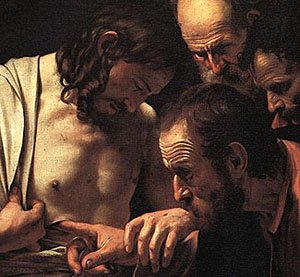Doubt and the inner journey - Feast of St. Thomas
 Who wants to be Doubting Thomas, anyway? Yet the saint reminds us that doubt\ is integral to the human condition and is therefore an aspect of the spiritual journey we will have to engage. Religious people, however, routinely pull the Thomas card, so to speak, when referring to unbelievers or lapsed ones. They are those others who need to be evangelised and brought back to the fold. By implication, believers are exempt. The Thomas of Scripture, however, was not a member of that group. He was an apostle chosen by Jesus – one of his most intimate companions. So he was very much a committed believer who made an extraordinary journey.
Who wants to be Doubting Thomas, anyway? Yet the saint reminds us that doubt\ is integral to the human condition and is therefore an aspect of the spiritual journey we will have to engage. Religious people, however, routinely pull the Thomas card, so to speak, when referring to unbelievers or lapsed ones. They are those others who need to be evangelised and brought back to the fold. By implication, believers are exempt. The Thomas of Scripture, however, was not a member of that group. He was an apostle chosen by Jesus – one of his most intimate companions. So he was very much a committed believer who made an extraordinary journey.
The Gospel of John happens to be the only one that mentions Thomas’ story, and for good reason. The Evangelist was concerned with the transmission of the faith to a community with no access to the eyewitness accounts of the risen Jesus. We, too, comprise the membership St John’s text targets. We believe by the gift of faith: “Happy are those who have not seen and yet believe” (Jn 20: 29). The figure of Thomas therefore has special applicability for those who profess to believe. As demanding as he seems in asking to see and touch the wounds of Jesus, Thomas allows us to encounter a God who meets us where we are and frees us to be ourselves.
How difficult it is to really hold on to the belief that God is in full command of our lives, particularly when things go wrong. The story of St Thomas addresses the believer who loves Jesus and is eager to follow no matter what that “way” entails (Jn14:5-6), but also goes through those stretches of uncertainty and despondency (Jn 11:16). He is a guide for confronting our darkest moments, when we find ourselves praying like the father whose son is possessed by a violent deaf and dumb spirit: “I do have faith. Help the little faith I have!” (Mk 9:25).
Like Thomas, the Twin, we carry in us a “doubleness”: the believer and doubter. His predicament invites us to ask: how do we bring a faith response to this reality of our being human? The world recently discovered that Blessed Mother Teresa had a long and intense struggle with an interior darkness. In 1959, she wrote: “In my soul I feel just that terrible pain of loss of God not wanting me — of God not being God — of God not existing.” Yet it seems that her honest dialogue with her doubt was pivotal to her profound spiritual life made visible in her immense self-giving and love for the poor. That deep questioning she carried was the shadow that drew her more fully into God’s light.
Inner trials are sure to come. We experience patches of unknowing and uncertainty that may include questions about the meaning of life and God’s love for us, even about Church teachings and practices– all signs of a mature spirituality. The key, it seems, is to honestly acknowledge our doubt– which is to say consistently bring and entrust our uncertainties and brokenness to the Wounded Healer who alone will transform us. Further, always remain rooted in one’s faith community even as we must honour our need for space. Thomas was somewhere else when Jesus appeared to the disciples, but he was connected enough to be told their story. This was instrumental in initiating his remarkable personal encounter with the resurrected Jesus.
Doubt certainly cannot become a permanent place or position. We must transition to faith. At the same time, this process cannot be forced, short-circuited or self-engineered. It is to be journeyed through as Jesus demonstrates in his patient dealing with Thomas. Without the hand of Jesus, visiting with our wounds and that of the world will only end in anger, despair and recrimination. It is indeed difficult for believers to even recognise their areas of unbelief. How or when do we not fully trust or doubt that God is in control? Like Thomas, we can be helped to a place of renewed faith that frees us to pronounce from the depth of our beings: “My Lord and my God!”(Jn 20: 28).
Prayer: My God, today my love for you needs your Love. Help my weak faith.
My Dear St Thomas
My dear Thomas,
saint we prefer not to imitate.
Who wants to be the one
branded doubting, anyway?
It doesn’t sit well with the pride
we take in announcing faith.
Being outside the chosen circle
is never ever comfortable.
What of that anyway – was it fate,
not being in the right place
that gave those others
a jump start on believing?
Or was it a way to teach
a different lesson?
O St Thomas, perhaps you had
the better part after all –
for to fully believe you pushed
at every decent border
to touch wounds you knew
well enough to name
until they became, for you,
a Saviour. Saint of what we believe
until we truly see, pray for us
that the unbelief our faith conceals
may match your honest doubt. –
From Approaching Sabbaths, 2009


 Votes : 0
Votes : 0









